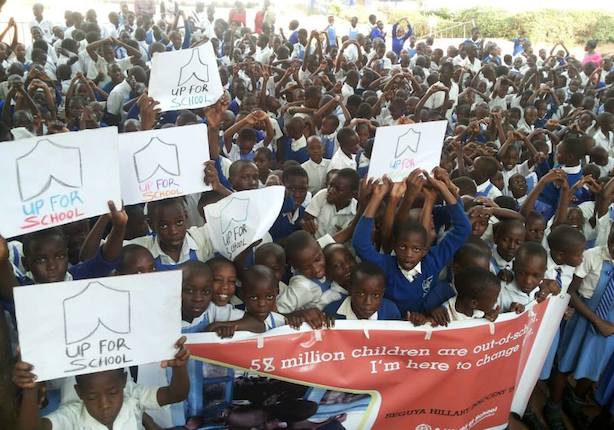“I will never forget when my father took me to school for the first time – it was where my passion to help change the world began”
One of Theirworld's network of Global Youth Ambassadors tells how education gave him a good start in life- and how the same opportunity needs to be given to Syrian refugee children.
‘’Education has indisputably been a pathway to progress at an individual as well as societal level’’.
That is the thought that came to mind when I began to reflect on the importance of education and how much of an impact it has in our lives.
I was born in the 1990s in a middle-income family (according to rural standards) that was able to fund my education since I was five years old.
That really gave me a best start in life – even though Uganda at the time was under a major recovery process due to the liberation war of 1986. Massive poverty, institutional breakdown, fewer schools that could provide high-quality education and unemployment also characterised the period.
I was fortunate at the time to go to a good pre-primary school founded by a church. That was only possible due to the fact that my father was capable of paying school fees for my elder brother and me.
There is nothing like your father waking you up early in the morning and telling you that it is time to go to school and making a commitment to take you there.
I will never forget a moment in my life when my father took me to school for the first time in 1995. My face lit up and I was so excited – not for school but for the love of the father who was interested in providing a bright future for his son.

That love of the father later turned into my love for school and striving for the best grades to amaze my father.
In school, I had the opportunity to engage and play with other children and also ask funny questions to teachers. This was a great opportunity for them to shape my thinking, perspectives and reasoning around different issues as well as my outlook later in life.
That is why every child deserves an education. An opportunity to be in school.
That is where my passion to contribute to change in the world originates and that is the same reason I am part of global initiatives like Theirworld’s movement A World at School, whose goal is to make sure all children are in school and learning.
I kicked off 2017 watching a documentary called The Forgotten Children to enlighten myself more about the situation of Syrian children and also the bigger picture of how crises, conflicts and activities like human trafficking affect children’s lives on a broader scale.
One thing I guarantee everyone who dares to watch this documentary is that you can’t finish it without crying or becoming emotional. It documents very well what Syrian children go through and their experience in refugee camps.
Their struggles include living without their families, running away from air strikes to cross borders into different countries for safety, surviving in unhealthy places without proper medical care, lack of nutritious food and no education.
Children suffering and being isolated in new countries they ran to with the hope of safety is something that global leaders need to look into seriously and generate a sustainable solution.
Children are children. Their futures shouldn’t be put at stake because of a series of inter-governmental meetings and dialogues organised between heads of states and leaders. What has resulted from this are resolutions and policy papers with promises that take forever to be implemented.
Humanity shouldn’t ask for viable reasons to help or support more than 75 million children whose education has been disrupted by conflicts. Nkulanga Enock
Humanity is never limited. We are limitless. It is policies and personal interests that are limited with goals, objectives and agendas that suit the interests of the pushers or those behind the orchestration. Humanity shouldn’t ask for viable reasons to help or support more than 75 million children whose education has been disrupted by conflicts.
Need is need and it doesn’t speak or understand the language in long political meetings and gatherings organised by those who have the power to effect change but are not responding quickly enough.
Those who stand to benefit from change are the majority. They don’t dress in suits but rather in rags, spend nights in tents, don’t have toilets, running safe drinking water or safe parks to play in.
They live daily without an education, food, no families, with dreams that never come to fruition. This is so true in the case of many of the Syrian refugee.
They are now in Turkey, Greece, the United Kingdom and the United States as well as other countries that have opened their borders to children fleeing to safety.
World leaders need to come to an understanding that all children are the same and demand the same things. Those are the very things enshrined in the UN Convention on the Rights of the Child as fundamental human rights for all children.
Secondly, the $22.1 billion needed in 2017, according to the Global Humanitarian Overview, to respond to 96.2 million people is a crucial target to save the people in most need. World leaders have a huge task to accomplish.
The world should be a better place – not just for our sake but for the sake of generations to follow.